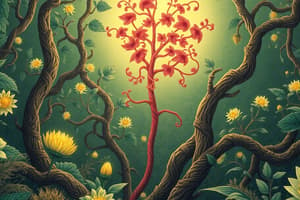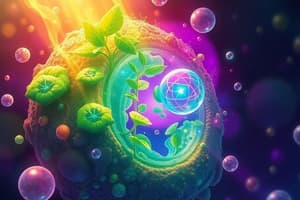Podcast
Questions and Answers
What gas do plants require to perform photosynthesis?
What gas do plants require to perform photosynthesis?
Carbon Dioxide
What is the main energy carrier found in all cells?
What is the main energy carrier found in all cells?
ATP
What is the main energy source needed by all cells?
What is the main energy source needed by all cells?
Glucose
What light absorbing molecules gather energy from the sun?
What light absorbing molecules gather energy from the sun?
What are the two parts of photosynthesis?
What are the two parts of photosynthesis?
What does the light dependent reaction give the Calvin cycle?
What does the light dependent reaction give the Calvin cycle?
What are organisms that make their own food called?
What are organisms that make their own food called?
What are organisms that don't make their own food called?
What are organisms that don't make their own food called?
What are the three parts of an ATP molecule?
What are the three parts of an ATP molecule?
When is energy released from an ATP molecule?
When is energy released from an ATP molecule?
What makes up an ADP molecule?
What makes up an ADP molecule?
What did Van Helmont conclude?
What did Van Helmont conclude?
What did Ingenhousz prove?
What did Ingenhousz prove?
Photosynthesis converts water and carbon dioxide into what?
Photosynthesis converts water and carbon dioxide into what?
What is the name of the main pigment found in plants?
What is the name of the main pigment found in plants?
What are the colors of the visible spectrum?
What are the colors of the visible spectrum?
What is a granum?
What is a granum?
What is the stroma?
What is the stroma?
What is the product of the Calvin cycle?
What is the product of the Calvin cycle?
What affects the rate of photosynthesis?
What affects the rate of photosynthesis?
What is the equation of photosynthesis?
What is the equation of photosynthesis?
What is the process of converting glucose into chemical energy in the presence of oxygen?
What is the process of converting glucose into chemical energy in the presence of oxygen?
What is the process of breaking a glucose molecule down into 2 pyruvic acids?
What is the process of breaking a glucose molecule down into 2 pyruvic acids?
Where does cellular respiration take place?
Where does cellular respiration take place?
What process occurs without oxygen and converts NADH back to NAD+?
What process occurs without oxygen and converts NADH back to NAD+?
What are the two types of energy carriers in the cell?
What are the two types of energy carriers in the cell?
What are the three parts of cellular respiration?
What are the three parts of cellular respiration?
What is the chemical equation for cellular respiration?
What is the chemical equation for cellular respiration?
What are the two types of fermentation?
What are the two types of fermentation?
What is the chemical equation for lactic acid fermentation?
What is the chemical equation for lactic acid fermentation?
What is the chemical equation for alcohol fermentation?
What is the chemical equation for alcohol fermentation?
What gas is released in cellular respiration?
What gas is released in cellular respiration?
How many ATP are produced from a single glucose molecule?
How many ATP are produced from a single glucose molecule?
What are the products of cellular respiration?
What are the products of cellular respiration?
What are the reactants of glycolysis?
What are the reactants of glycolysis?
What part of cellular respiration takes place in the mitochondria?
What part of cellular respiration takes place in the mitochondria?
Where does fermentation occur?
Where does fermentation occur?
Where does glycolysis occur?
Where does glycolysis occur?
How many ATP's does glycolysis produce?
How many ATP's does glycolysis produce?
Does glycolysis require input energy?
Does glycolysis require input energy?
What is the name of the electron carrier in photosynthesis?
What is the name of the electron carrier in photosynthesis?
What type of process takes place in the presence of oxygen?
What type of process takes place in the presence of oxygen?
What type of process takes place without the presence of oxygen?
What type of process takes place without the presence of oxygen?
What are the products of photosynthesis?
What are the products of photosynthesis?
What type of organisms perform cellular respiration?
What type of organisms perform cellular respiration?
What type of organisms perform photosynthesis?
What type of organisms perform photosynthesis?
What is made using the energy from the electron transport chain?
What is made using the energy from the electron transport chain?
How many electrons can a NADH molecule carry?
How many electrons can a NADH molecule carry?
What are the byproducts of cellular respiration?
What are the byproducts of cellular respiration?
Flashcards are hidden until you start studying
Study Notes
Photosynthesis Overview
- Plants require carbon dioxide (CO2) to perform photosynthesis.
- Key energy carrier in all cells is adenosine triphosphate (ATP).
- Main energy source for cells is glucose.
Photosynthesis Mechanisms
- Light absorbing molecules that gather solar energy are called pigments.
- Photosynthesis consists of two main parts: light-dependent reactions and the Calvin cycle.
- Light-dependent reactions produce ATP and NADPH for the Calvin cycle.
Autotrophs vs. Heterotrophs
- Autotrophs are organisms that produce their own food.
- Heterotrophs cannot synthesize their own food and rely on other organisms.
ATP and Energy Release
- ATP consists of adenosine triphosphate, while ADP is made of adenosine diphosphate.
- Energy is released from ATP when the third phosphate group is removed.
Historical Discoveries
- Van Helmont concluded that plants gain mass primarily from water.
- Ingenhousz demonstrated that plants produce oxygen only when exposed to light.
Photosynthesis Products
- Photosynthesis transforms water and carbon dioxide into oxygen and glucose.
- The chemical equation for photosynthesis is:
- 6H2O + 6CO2 → 6O2 + C6H12O6
Pigments and Light Spectrum
- The main pigment in plants is chlorophyll.
- Visible spectrum includes red, orange, yellow, green, blue, indigo, and violet.
Chloroplast Structure
- Granum refers to a stack of thylakoids within the chloroplast.
- Stroma is the area in the chloroplast surrounding granum.
Factors Affecting Photosynthesis
- Rate of photosynthesis is influenced by water availability, temperature, and light intensity.
Cellular Respiration Overview
- Cellular respiration is the process of converting glucose into chemical energy in the presence of oxygen.
- Glycolysis breaks down glucose into two pyruvic acids.
- Cellular respiration occurs in the cytoplasm and mitochondria.
Fermentation Processes
- Fermentation processes occur without oxygen, converting NADH back to NAD+.
- Two types of fermentation are alcohol fermentation and lactic acid fermentation.
Energy Carriers
- Energy carriers in the cell include glucose and ATP.
- NADP+ is the primary electron carrier used in photosynthesis.
Cellular Respiration Equations
- The chemical equation for cellular respiration is:
- 6O2 + C6H12O6 → 6CO2 + 6H2O + 36ATP
- Byproducts of cellular respiration include water and carbon dioxide.
Glycolysis Details
- Glycolysis occurs in the cytoplasm and produces 2 ATP.
- It requires input energy in the form of glucose.
Organismal Roles in Processes
- Animals perform cellular respiration.
- Plants conduct photosynthesis.
Electron Transport in Photosynthesis
- NADH, made using energy from the electron transport chain, carries two electrons.
Aerobic and Anaerobic Processes
- Aerobic processes require oxygen, while anaerobic processes do not.
- Both types of organisms rely on these processes to meet their energy needs.
Studying That Suits You
Use AI to generate personalized quizzes and flashcards to suit your learning preferences.




